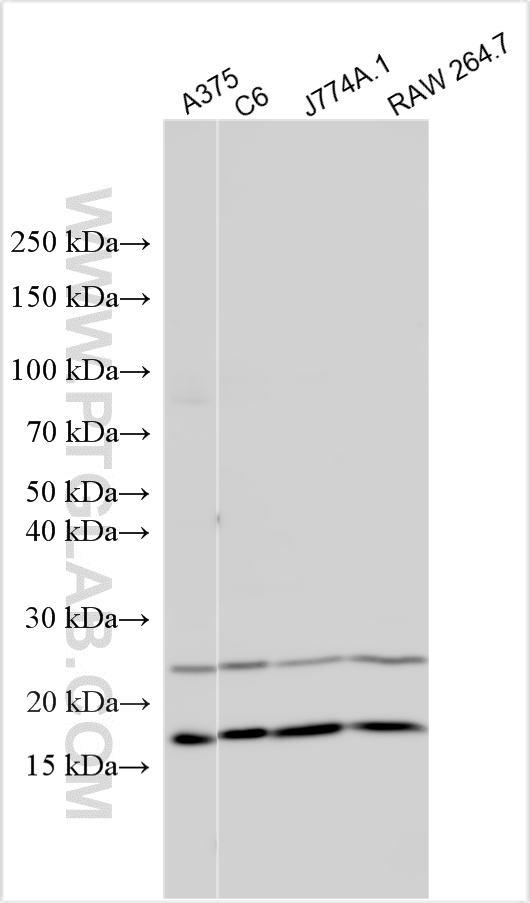验证数据展示
经过测试的应用
| Positive WB detected in | A375 cells, C6 cells, J774A.1 cells, RAW 264.7 cells |
推荐稀释比
| 应用 | 推荐稀释比 |
|---|---|
| Western Blot (WB) | WB : 1:500-1:2000 |
| It is recommended that this reagent should be titrated in each testing system to obtain optimal results. | |
| Sample-dependent, Check data in validation data gallery. | |
产品信息
15210-1-AP targets DAZAP2 in WB, ELISA applications and shows reactivity with human, mouse, rat samples.
| 经测试应用 | WB, ELISA Application Description |
| 经测试反应性 | human, mouse, rat |
| 免疫原 |
CatNo: Ag7364 Product name: Recombinant human DAZAP2 protein Source: e coli.-derived, PGEX-4T Tag: GST Domain: 1-168 aa of BC002334 Sequence: MNSKGQYPTQPTYPVQPPGNPVYPQTLHLPQAPPYTDAPPAYSELYRPSFVHPGAATVPTMSAAFPGASLYLPMAQSVAVGPLGSTIPMAYYPVGPIYPPGSTVLVEGGYDAGARFGAGATAGNIPPPPPGCPPNAAQLAVMQGANVLVTQRKGNFFMGGSDGGYTIW 种属同源性预测 |
| 宿主/亚型 | Rabbit / IgG |
| 抗体类别 | Polyclonal |
| 产品类型 | Antibody |
| 全称 | DAZ associated protein 2 |
| 别名 | PRTB, Proline-rich transcript in brain protein, KIAA0058, Deleted in azoospermia-associated protein 2, DAZ-associated protein 2 |
| 计算分子量 | 17 kDa |
| 观测分子量 | 17 kDa, 22 kDa |
| GenBank蛋白编号 | BC002334 |
| 基因名称 | DAZAP2 |
| Gene ID (NCBI) | 9802 |
| 偶联类型 | Unconjugated |
| 形式 | Liquid |
| 纯化方式 | Antigen affinity purification |
| UNIPROT ID | Q15038 |
| 储存缓冲液 | PBS with 0.02% sodium azide and 50% glycerol, pH 7.3. |
| 储存条件 | Store at -20°C. Stable for one year after shipment. Aliquoting is unnecessary for -20oC storage. |
背景介绍
DAZAP2, also named KIAA0058, has six isoforms. In unstressed cells, it promotes SIAH1-mediated polyubiquitination and degradation of the serine/threonine-protein kinase HIPK2, probably by acting as a loading factor that potentiates complex formation between HIPK2 and ubiquitin ligase SIAH1. In response to DNA damage, it localizes to the nucleus following phosphorylation by HIPK2 and modulates the expression of a subset of TP53/p53 target genes by binding to TP53 at target gene promoters (PMID: 33591310).
实验方案
| Product Specific Protocols | |
|---|---|
| WB protocol for DAZAP2 antibody 15210-1-AP | Download protocol |
| Standard Protocols | |
|---|---|
| Click here to view our Standard Protocols |


